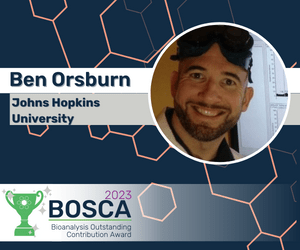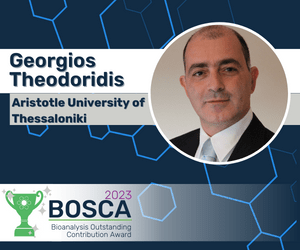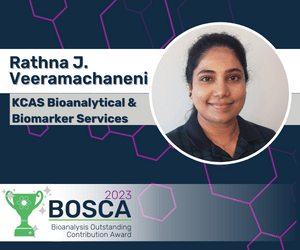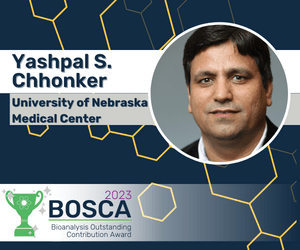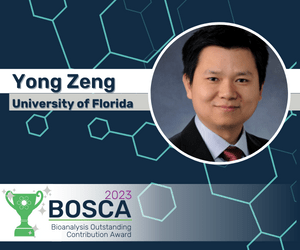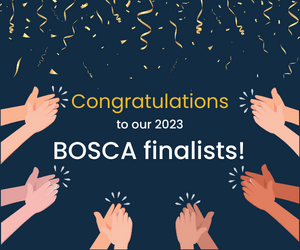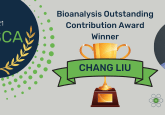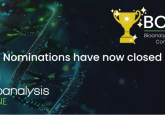BOSCA 2023: your top 5 candidates announced!
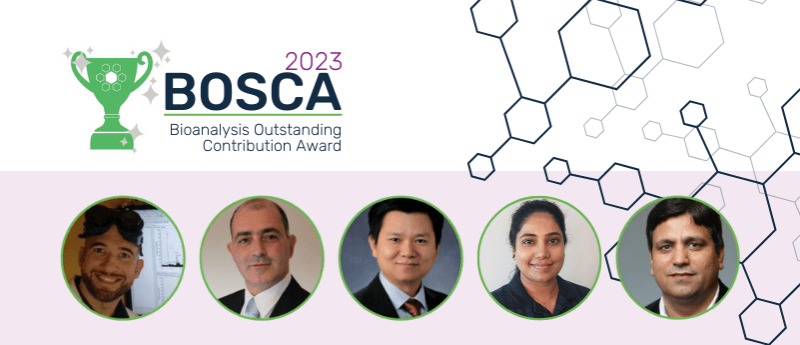
BOSCA 2023: the finalists
We have received an extraordinary selection of candidates for this year’s Bioanalysis Outstanding Contribution Award and we’re thrilled to be able to celebrate the career-long achievements of five deserving scientists. We will be announcing the winner of the 2023 BOSCA Award in early 2024, so make sure to keep a lookout for updates here. In the meantime, we hope you enjoy reading about the fantastic candidates of 2023!
|
|
Georgios Theodoridis Professor of Analytical Chemistry |
|
Rathna J. Veeramachaneni Director of BioPharma LC-MS/MS |
|
|
Yong Zeng Associate Professor & Analytical Division Head |
|
About the candidates:
Get to know our top five BOSCA candidates and see what their nominator had to say about them.
The top 5 candidates
 Ben Orsburn
Ben Orsburn
Instructor & Principal Investigator
Johns Hopkins University (MD, USA)
Ben Orsburn received his PhD at Virginia Tech (VA, USA), his research focusing on the use of mass spectrometry (MS) to understand the bacterial cell wall. He received postdoctoral fellowships in proteomics at Johns Hopkins and the National Cancer Institute (MD, USA) before spending the next decade in industry. In 2020, Ben returned to academia to help revive the historic Mid-Atlantic Mass Spectrometry Center (MD, USA), leading to him becoming an independent researcher in late 2022. His research now focuses on applying MS to understand heterogeneity in drug response with a focus on single cell MS and proteomics. He is also the manager of the Pharmacology Mass Spectrometry Shared Instrument Facility (MD, USA) and was recently appointed as Director of the Biomarker Development Metabolism Unit at the Johns Hopkins Institute for Translational Research. In his first year as an independent researcher, the Orsburn Lab authored or contributed to 16 published manuscripts with many more posted on preprint servers such as OSFPreprints, Protocols.io and Biorxiv. Ben is also the Chair of the US Human Proteomics Organization Virtual Media Organization, the founder and author of the popular science blog News in Proteomics Research, and the Co-host of THE Proteomics Show, a popular podcast sponsored by the US Human Proteomics Organization.
“Ben left industry a couple of years ago to reinvent himself as an academic. He’s always been a big scientific communicator through his blog, ‘News In Proteomics Research’, and through his thousands of followers on [X, formally known as] Twitter. Only a couple of years in and he’s already publishing big papers including the first credible study on protein post-translational modifications in single human cells. He’s speaking all over the world as his lab seems to be the first one actually applying the new field of single cell proteomics to practical problems like chemotherapy resistance. His newest preprint is one of the biggest single cell proteomics studies by mass spectrometry ever performed and it is a solo author study. The breadth of his work is really interesting as well. Between the single cell studies he published the largest library of pesticide detection methods ever put in the public domain. In addition, he recently launched a fun and approachable podcast on proteomics that I’ve heard the Human Proteomics Organization has already sponsored for a 3rd season into 2024, due to the response it has received.”
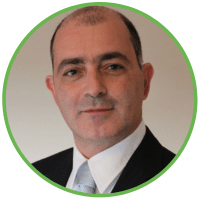
Georgios Theodoridis
Professor of Analytical Chemistry
Aristotle University of Thessaloniki (Greece)
Georgios Theodoridis is a Professor of Analytical Chemistry in the Department of Chemistry, at Aristotle University of Thessaloniki. He studied Chemistry (1990) and received his PhD in 1994 in separations sciences from Aristotle University. He has worked at the University of Pardubice (Czech Republic), the University of Leiden (The Netherlands), AstraZeneca (Cambridge, UK) and the Istituto Agrario di San Michele all’Adige, Edmund Mach Foundation (Trento, Italy). His research focuses on the application of LC-MS and GC-MS in metabolite profiling and bioanalysis. Georgios leads the BIOMIC initiative of Aristotle University and FoodOmicsGR National Research Infrastructure Thessaloniki (Greece). He has co-authored ~230 peer reviewed articles, 20 book chapters and delivered more than 150 presentations at international meetings. He serves as Editor of J. Chromatogr. B Biomed. Appl. and is part of the editorial board of Metabolites, Open J. Biochem., J. Integrated Omics, and Separations. Georgios is also a recipient of international awards and distinctions, including Power list 2023, and is the Co-founder of ThetaBiomarkers (Thermi, Greece), a spinoff active on the development of cutting-edge bioanalytical solutions in life sciences, nutrition and wellness.
“Professor Georgios Theodoridis has together with his team developed an assay from quantitative dried blood for the analysis of four ceramide species C16:0, C18:0, C24:0 and C24:1. This new assay enables the study of these molecules through a patient centric sampling solution. This is a major step forward to enable remote trials and easier access to patient cohorts. Further, Prof Theodoridis has transferred the assay and developed a new bioanalytical service company, ThetaBiomarkers, that offers the tests as a service. This way, he has also made the development accessible to the wider community for anyone interested in the study of these ceramides.”
 Rathna J. Veeramachaneni
Rathna J. Veeramachaneni
Director of BioPharma LC-MS/MS
KCAS Bioanalytical and Biomarker Services (KS, USA)
Rathna is currently the Director of BioPharma LC-MS/MS at KCAS Bioanalytical and Biomarker Services and has been with the company for over 4 years. Prior to KCAS, Rathna worked at Celerion (NE, USA) and Pfizer (NY, USA) developing quantitative methods for small and large molecules both in the CRO and Pharma space. Rathna received her PhD from Duquesne University (PA, USA) working on Crosslinking combined with qualitative proteomic mass spectrometry to determine the structure of membrane ion channels in multiple conformational states. Rathna has significant expertise in hybrid LC-MS/MS both at the protein and peptide level. Furthermore, she also has experience in more traditional LC-MS/MS assays utilizing protein precipitation, digestion and solid phase extraction approaches. She has worked on many different biopharmaceutical modalities such as mAbs, ADCs, antibody-reagent complexes, fusion and chimeric proteins as well as biomarkers for both small and large molecules including glycosphingolipids and eicosanoids. Her therapeutic area of expertise includes indications in cancer, inflammation, neurodegenerative and rare diseases. Rathna is passionate about using the best science to help drive and support the drug development process and advocates for customized, strategic approaches by incorporating notable advancements to find creative solutions that are better, faster and/or more efficient.
“…Many clients that come to us with complex protein quantification needs for their projects (proteins, peptides, ADCs etc.) are most often well versed in prototypical ligand binding approaches for these modalities, however, [they] generally do not fully understand conceptually the power of BioPharma LC-MS and the hows and whys [of how] this would apply to their molecule and program. Rathna is not only exceptional at generating data at the bench and leading a fantastic team, but also extraordinary at conveying the science externally to the client. As we all know science is science, where updates can be good and/or bad, but regardless of the outcome, Rathna is a solution provider always positioning the program for success and setting the client at ease…”
 Yashpal S. Chhonker
Yashpal S. Chhonker
Assistant Professor (Research)
University of Nebraska Medical Center (NE, USA)
Yashpal Chhonker received his PhD from CSIR-Central Drug Research Institute (Lucknow, India) in pre-clinical and clinical pharmacokinetic and metabolism studies and was awarded the Dr M.M Dhar Memorial Distinguished Career Achievement Award in 2015 for best PhD thesis. Yashpal has worked at the University of Nebraska Medical Center as a Bioanalytical Researcher for the last 9 years and has continued to expand his bioanalytical expertise by developing fast, sensitive and specific analytical quantitation methods for small molecules/druggable leads and endogenous biomarkers. To date, he has published more than 100 bioanalytical research articles in esteemed journals, including Nat. Nanotech., PNAS, and J. of Med. Chem. Yashpal is particularly interested in establishing robust and accurate multiplex methods to quantify various endogenous biomarkers in order to better understand their role in pathophysiological conditions. One of his recent accomplishments involves his bioanalytical expertise leading to the development of a promising new cancer treatment that targets a protein called geranylgeranyl diphosphate synthase, GGDPS, as a collective team initiative of the University of Nebraska Medical Center.
“…[Yashpal] has contributed significantly to the field of bioanalysis over the last 5 years, with over 60 original research publications and multiple national and international presentations. In addition, he provides mentorship and guidance on bioanalytical method development to eight graduate students and four post-doctoral fellows. He is at the cutting edge of bioanalysis with methods utilizing dried blood spot analysis for national covid studies, metabolomics for biomarker identification and small molecule analysis for novel drug development. He is a member of national organizations including the American Society of Tropical Medicine and Hygiene and the American Society of Clinical Pharmacology and Therapeutics. Dr Chhonker has my strongest recommendation for this award.”
 Yong Zeng
Yong Zeng
Associate Professor & Analytical Division Head
University of Florida (FL, USA)
Dr Zeng is an Associate Professor and Head of the Analytical Division in the Department of Chemistry at the University of Florida. He is also an Affiliate Faculty of Biomedical Engineering and a member of the Health Cancer Center at the University of Florida. His research draws on chemistry, material sciences, bioengineering and medicine to develop innovative micro and nanoscale tools to advance precision medicine of challenging diseases, in particular cancer. His technological innovations span biomolecular assays to lab-on-a-chip systems to smart biosensors powered by robotics and AI for sensitive and quantitative measurements of liquid biopsies and biomarkers, including extracellular vesicles (EVs), proteins and nucleic acids. Specifically, Yong is internationally recognized for his pioneering research in developing microfluidic technologies for isolation and analysis of tumor-derived EVs, an emerging paradigm of liquid biopsies for cancer diagnostics and therapeutics. He is devoted to translational research to bring the technological innovations from the benchtop to bedside, working with biologists and clinicians. His work has led to many highly visible publications in top-tier journals, including Nat. Biomed. Eng. and Sci. Transl. Med., which was featured on numerous news coverages in professional and public media outlets such as the NIH Director’s Blog and the JAMA Network.
“…Prof Zeng has pioneered the development of micro/nanoscale tools for EV analysis and is a world-renowned leader in transforming EV-based diagnostics with innovations in bioanalysis. His seminal contributions to EV bioanalysis are exemplified by his papers recognized among the few early keystone publications in this emerging field. He published a Lab Chip paper in 2014 reporting the first-of-its-kind microfluidic chip that integrated immuno-isolation and analysis of tumor EVs. It has stood the test of time, being cited >420 times and recognized as a Web of Science Highly Cited Paper (HCP, top 1% in Chemistry). Going far beyond microfluidics, his cutting-edge research made exceptional contributions to multiple areas, including nanobiosensing and CRISPR-powered diagnostics. His conceptually creative 3D nano-herringbone chip, reported in Nat. Biomed. Eng. … offers unprecedented analytical capabilities than prior bioparticle analysis methods. Most recently, he developed a simple one-pot CRISPR/Cas12a miRNA assay that immediately addresses the drawbacks of existing methods, paving a new way for point-of-care testing… He [serves] as standing member of the NIH ISD Study Section and the Executive Technical Program Committee for the MicroTAS conference, a mark of distinction for a researcher so early in career development. Since 2014, he has secured >$11 million [in] research funding. Such [a] successful funding record demonstrates how the communities have embraced his disruptive ideas for pushing the boundaries of bioanalysis and liquid-biopsy diagnostics. Overall, Prof Zeng is a bona fide superstar and I am certain that the community will agree he deserves this Bioanalysis Award.”

